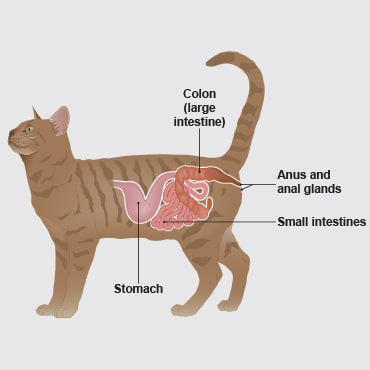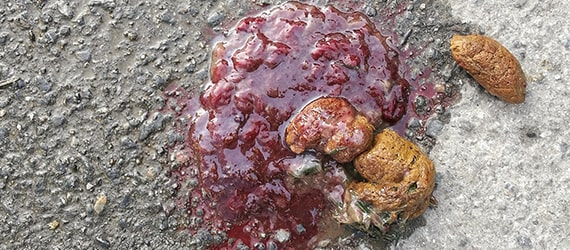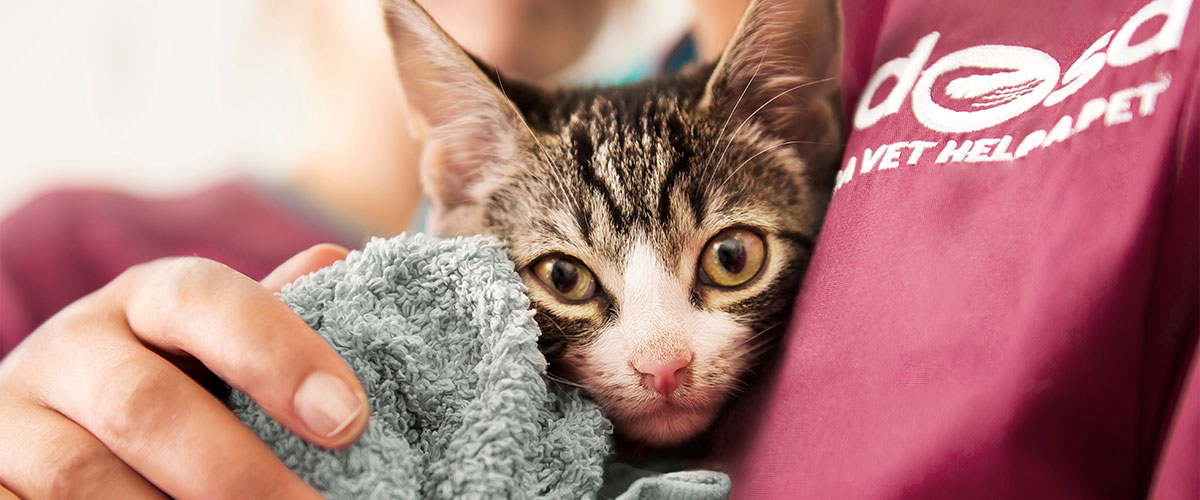Blood in your cat's poo
Overview
- Blood in poo can either be fresh (red) or digested (black).
- There are many different things that can cause blood in your cat’s poo but fortunately, many of them are minor and treatable.
- It’s important to have your cat checked by your vet if they have blood in their poo, especially if they seem unwell, have any other symptoms, or are a kitten.
General information
Finding blood in your cat’s poo can be worrying, fortunately, many of the causes are treatable. Blood in poo can be fresh (red) or digested (black). Fresh blood usually appears as bright red streaks on the outside of a poo, or as drips of blood from the anus (bottom), whereas digested blood tends to turn the whole poo black (vets call this ‘melena’). Fresh blood in poo is usually because of a problem in the lower part of the guts (such as the colon, anus or anal glands), but digested blood usually points to bleeding further up the guts (such as the stomach or small intestines). It’s important to have your cat checked by your vet if you’ve noticed blood in their poo, especially if they seem unwell.

Blood in your cat's poo could be coming from their stomach, intestines, colon, anus or anal glands.

Fresh blood in a poo

Black poo - digested blood
Causes
Blood in a cat's poo can be caused by:
- Worms and other gut parasites
For example, Giardia and Tritrichomonas, particularly common in kittens.
- A food intolerance
Your cat might develop blood in their poo if they eat something they are allergic to or that upsets their stomach. In some cases this can also cause diarrhoea and vomiting.
- Colitis
Inflammation of the colon (large intestine) can cause diarrhoea containing fresh blood and mucus.
- Infections
Bacterial infections such as Salmonella, and infectious diseases such as Feline Panleukopenia (FPV) can cause blood in the poo.
- Anal gland problems
If you notice fresh blood on your cat’s poo, and around their anus, it’s possible that they might have a problem with their anal glands (the two little sacs that sit just inside the anus).
Similar to people, stress in cats can cause an upset tummy and in severe cases, blood in their poo.
- Pancreatitis
Inflammation of the pancreas usually causes diarrhoea, which can sometimes contain blood.
- Medications
Some medications (such as NSAID’s and steroids) can cause gut irritation and bleeding in the guts.
- Rectal polyp
Rectal polyp’s are benign (non-cancerous) lumps inside the large intestine. If they become inflamed and sore they often bleed.
- Cancer
Cancerous lumps in the gut often become ulcerated and bleed, leading to fresh or digested blood in the poo (or sometimes both).
Toxins that damage the guts or cause clotting problems (such as rat poison) can cause blood in the poo.
- Bleeding problem
If your cat has a bleeding disorder/clotting problem they might bleed into their guts - this can be very severe and you may also see other signs of clotting problems such as bruising or blood from the nose.
Kittens
If your kitten has blood in their poo it’s important to contact your vet for advice, especially if they also have diarrhoea or are off their food. Worms are the most common cause of blood in a kitten’s poo, but it’s always best to have them checked for anything else because kittens prone to becoming quickly dehydrated when poorly.
When to contact your vet
Always contact your vet if you notice blood in your cat’s poo. If there is only a very small amount of blood, your cat is bright, eating properly and seems otherwise healthy and happy, your vet may advise trying to settle their stomach for 24 hours before having an appointment. This is likely to involve giving small amounts of a very bland diet (i.e. boiled chicken breast or white fish) regularly for a few days.
You know your cat best. If they don’t have the symptoms listed above but you are still concerned it’s always best to contact your vet.
Published: November 2020
Did you find this page useful?
Tell us more
Please note, our vets and nurses are unable to respond to questions via this form. If you are concerned about your pet’s health, please contact your vet directly.
Thank you for your feedback
Want to hear more about PDSA and get pet care tips from our vet experts?
Sign up to our e-newsletter
Written by vets and vet nurses. This advice is for UK pets only. Illustrations by Samantha Elmhurst.

